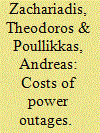| Srl | Item |
| 1 |
ID:
116982


|
|
|
|
|
| Publication |
2012.
|
| Summary/Abstract |
We study the costs of electricity disruptions in Cyprus, which suffered severe power shortages in summer 2011 after an explosion that destroyed 60% of its power generating capacity. We employ both economic and engineering approaches to assess these costs. Among other calculations, we provide estimates of the value of lost load by economic sector and the hourly value of electricity by season and type of day. The results of two economic methods employed to assess welfare losses differ largely, indicating that the assessment of outage costs is associated with many uncertainties. Our calculations show that the emergency actions taken by national energy authorities in response to that accident, though not necessarily optimal, have generally been appropriate and in line with international best practices: the additional costs incurred due to these measures are lower than the economic losses avoided thanks to these actions. Preferential treatment of specific consumer types in the case of repeated power outages remains an open policy question.
|
|
|
|
|
|
|
|
|
|
|
|
|
|
|
|
| 2 |
ID:
094213


|
|
|
|
|
| Publication |
2010.
|
| Summary/Abstract |
This paper provides a forecast of electricity consumption in Cyprus up to the year 2030, based on econometric analysis of energy use as a function of macroeconomic variables, prices and weather conditions. If past trends continue electricity use is expected to triple in the coming 20-25 years, with the residential and commercial sectors increasing their already high shares in total consumption. Besides this reference scenario it was attempted to assess the impact of climate change on electricity use. According to official projections, the average temperature in the Eastern Mediterranean is expected to rise by about 1 °C by the year 2030. Using our econometrically estimated model, we calculated that electricity consumption in Cyprus may be about 2.9% higher in 2030 than in the reference scenario. This might lead to a welfare loss of 15 million Euros in 2020 and 45 million Euros in 2030; for the entire period 2008-2030 the present value of costs may exceed 200 million Euros (all expressed in constant Euros of 2007). Moreover, we assessed the additional peak electricity load requirements in the future because of climate change: extra load may amount to 65-75 Megawatts (MW) in the year 2020 and 85-95 MW in 2030.
|
|
|
|
|
|
|
|
|
|
|
|
|
|
|
|
| 3 |
ID:
118818


|
|
|
|
|
| Publication |
2013.
|
| Summary/Abstract |
With the aid of detailed automobile sales data this paper looks into changes in car attributes and CO2 emissions in Germany in the years 1998-2008, both at aggregate level and within individual car segments. New car CO2 emissions have not decreased at the expected levels because of negligible downsizing and increasing power of diesel cars. Interestingly, today there are relatively more models available with higher-than-average emission levels than in the late 1990s. We further constructed matched pairs of gasoline and diesel models in order to explore how their power and emissions ratio has evolved during the same decade. Results imply that German consumers may not have chosen to buy the diesel powered matched pair of a gasoline car they would have bought a few years earlier; instead they selected among the variety of diesel cars available in the market, and preferred a more powerful diesel car than what they might have bought otherwise. These findings reinforce the view that low-carbon transport policies must address the issue of changes in vehicle size and performance, which compromise the environmental effectiveness of regulations. In contrast to current EU regulations, CO2-related standards should discourage increases in a vehicle's weight and power.
|
|
|
|
|
|
|
|
|
|
|
|
|
|
|
|
| 4 |
ID:
109702


|
|
|
|
|
| Publication |
2011.
|
| Summary/Abstract |
This short paper presents results from an energy forecast model for the Republic of Cyprus. The model was used during years 2010-2011 to assist national authorities in their preparation of the National Renewable Energy Action Plan and the Energy Efficiency Action Plan of Cyprus in line with the requirements of European Union Directives. Major macroeconomic and price assumptions of the model are presented, and results from model application under different assumptions with regard to the evolution of energy efficiency are outlined and discussed. On the basis of these scenarios the paper discusses policy implications for Cyprus regarding the country's compliance with EU energy and climate legislation.
|
|
|
|
|
|
|
|
|
|
|
|
|
|
|
|
| 5 |
ID:
069818


|
|
|